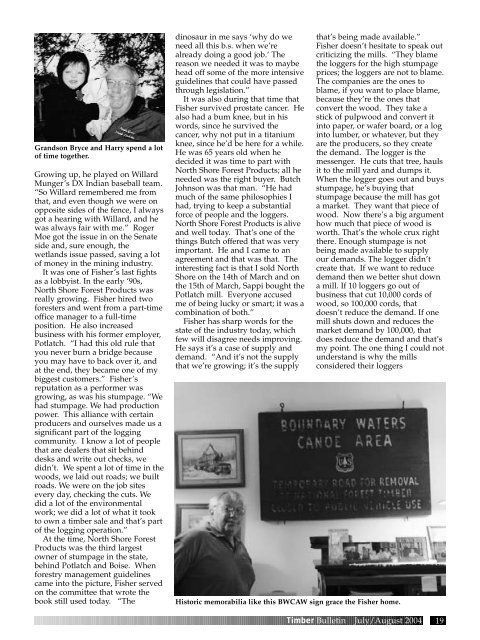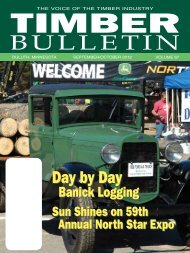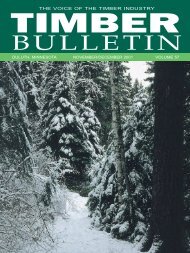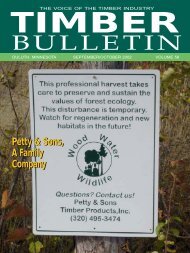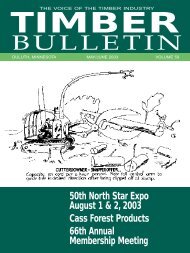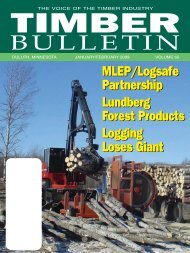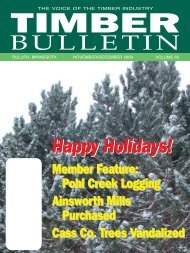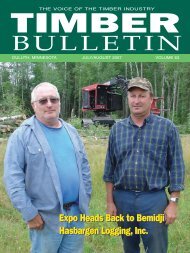Timber Bulletin Jul/Aug - Minnesota Forest Industries
Timber Bulletin Jul/Aug - Minnesota Forest Industries
Timber Bulletin Jul/Aug - Minnesota Forest Industries
Create successful ePaper yourself
Turn your PDF publications into a flip-book with our unique Google optimized e-Paper software.
Grandson Bryce and Harry spend a lot<br />
of time together.<br />
Growing up, he played on Willard<br />
Munger’s DX Indian baseball team.<br />
“So Willard remembered me from<br />
that, and even though we were on<br />
opposite sides of the fence, I always<br />
got a hearing with Willard, and he<br />
was always fair with me.” Roger<br />
Moe got the issue in on the Senate<br />
side and, sure enough, the<br />
wetlands issue passed, saving a lot<br />
of money in the mining industry.<br />
It was one of Fisher’s last fights<br />
as a lobbyist. In the early ‘90s,<br />
North Shore <strong>Forest</strong> Products was<br />
really growing. Fisher hired two<br />
foresters and went from a part-time<br />
office manager to a full-time<br />
position. He also increased<br />
business with his former employer,<br />
Potlatch. “I had this old rule that<br />
you never burn a bridge because<br />
you may have to back over it, and<br />
at the end, they became one of my<br />
biggest customers.” Fisher’s<br />
reputation as a performer was<br />
growing, as was his stumpage. “We<br />
had stumpage. We had production<br />
power. This alliance with certain<br />
producers and ourselves made us a<br />
significant part of the logging<br />
community. I know a lot of people<br />
that are dealers that sit behind<br />
desks and write out checks, we<br />
didn’t. We spent a lot of time in the<br />
woods, we laid out roads; we built<br />
roads. We were on the job sites<br />
every day, checking the cuts. We<br />
did a lot of the environmental<br />
work; we did a lot of what it took<br />
to own a timber sale and that’s part<br />
of the logging operation.”<br />
At the time, North Shore <strong>Forest</strong><br />
Products was the third largest<br />
owner of stumpage in the state,<br />
behind Potlatch and Boise. When<br />
forestry management guidelines<br />
came into the picture, Fisher served<br />
on the committee that wrote the<br />
book still used today. “The<br />
dinosaur in me says ‘why do we<br />
need all this b.s. when we’re<br />
already doing a good job.‘ The<br />
reason we needed it was to maybe<br />
head off some of the more intensive<br />
guidelines that could have passed<br />
through legislation.”<br />
It was also during that time that<br />
Fisher survived prostate cancer. He<br />
also had a bum knee, but in his<br />
words, since he survived the<br />
cancer, why not put in a titanium<br />
knee, since he’d be here for a while.<br />
He was 65 years old when he<br />
decided it was time to part with<br />
North Shore <strong>Forest</strong> Products; all he<br />
needed was the right buyer. Butch<br />
Johnson was that man. “He had<br />
much of the same philosophies I<br />
had, trying to keep a substantial<br />
force of people and the loggers.<br />
North Shore <strong>Forest</strong> Products is alive<br />
and well today. That’s one of the<br />
things Butch offered that was very<br />
important. He and I came to an<br />
agreement and that was that. The<br />
interesting fact is that I sold North<br />
Shore on the 14th of March and on<br />
the 15th of March, Sappi bought the<br />
Potlatch mill. Everyone accused<br />
me of being lucky or smart; it was a<br />
combination of both.”<br />
Fisher has sharp words for the<br />
state of the industry today, which<br />
few will disagree needs improving.<br />
He says it’s a case of supply and<br />
demand. “And it’s not the supply<br />
that we’re growing; it’s the supply<br />
that’s being made available.”<br />
Fisher doesn’t hesitate to speak out<br />
criticizing the mills. “They blame<br />
the loggers for the high stumpage<br />
prices; the loggers are not to blame.<br />
The companies are the ones to<br />
blame, if you want to place blame,<br />
because they’re the ones that<br />
convert the wood. They take a<br />
stick of pulpwood and convert it<br />
into paper, or wafer board, or a log<br />
into lumber, or whatever, but they<br />
are the producers, so they create<br />
the demand. The logger is the<br />
messenger. He cuts that tree, hauls<br />
it to the mill yard and dumps it.<br />
When the logger goes out and buys<br />
stumpage, he’s buying that<br />
stumpage because the mill has got<br />
a market. They want that piece of<br />
wood. Now there’s a big argument<br />
how much that piece of wood is<br />
worth. That’s the whole crux right<br />
there. Enough stumpage is not<br />
being made available to supply<br />
our demands. The logger didn’t<br />
create that. If we want to reduce<br />
demand then we better shut down<br />
a mill. If 10 loggers go out of<br />
business that cut 10,000 cords of<br />
wood, so 100,000 cords, that<br />
doesn’t reduce the demand. If one<br />
mill shuts down and reduces the<br />
market demand by 100,000, that<br />
does reduce the demand and that’s<br />
my point. The one thing I could not<br />
understand is why the mills<br />
considered their loggers<br />
Historic memorabilia like this BWCAW sign grace the Fisher home.<br />
<strong>Timber</strong> <strong>Bulletin</strong> <strong>Jul</strong>y/<strong>Aug</strong>ust 2004<br />
19


